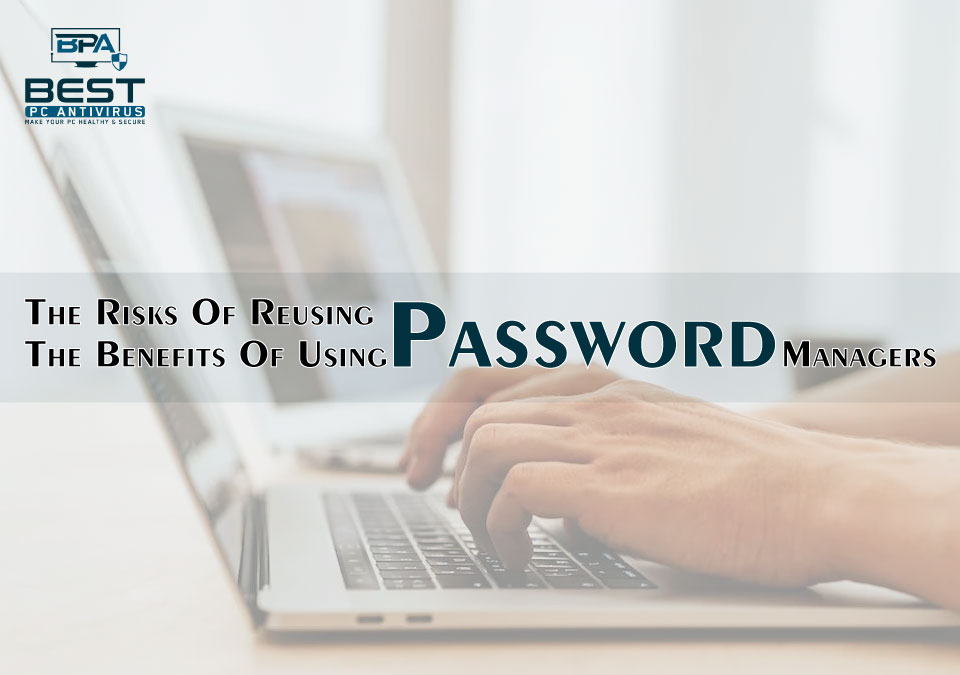If you are like me (in which case, I’m sorry friend, it’s rough but you will get through it), you too don’t bother creating new passwords for each case. Not gonna lie, that’s kinda convenient for us lazy lizards, but there are infinite risks of reusing passwords and benefits of using password managers. Learning how reusing passwords can lead to increased risk of data breaches, simplification of password cracking, weakened security measures, facilitated identity theft, increased liability, and financial losses, will help you keep your privacy intact in the world of bounty hunters with cell phones. So let’s dive into today’s blog on risks of reusing passwords and the benefits of using password managers.
Risks of Reusing passwords –
Increased Risk of Data Breaches:
Reusing passwords across multiple accounts increases the risk of data breaches because if a single password is compromised, an attacker can use it to access all of your accounts that use the same password. This increases the likelihood of sensitive information being stolen or compromised.
For example, if you use the same password for your email account, social media account, and online banking account, a hacker who gains access to your email password will also have access to your other accounts. This puts your personal and financial information at risk.
Additionally, data breaches often result in password information being sold or traded on the dark web, meaning that your compromised password could be used by multiple attackers to access your accounts. Reusing passwords makes it easier for attackers to compromise multiple accounts and steal sensitive information, increasing the risk of data breaches.
Simplifies Password Cracking:
Reusing passwords simplifies password cracking because it enables attackers to use the same password-cracking techniques and tools on multiple accounts. If an attacker obtains a password through a data breach, phishing attack, or other means, they can use that password to attempt to gain access to other accounts that use the same password.
This increases the efficiency of password cracking because an attacker can use the same techniques and tools to compromise multiple accounts instead of having to use different techniques and tools for each individual account. Additionally, many automated password-cracking tools are designed to target common passwords, so reusing passwords makes it easier for attackers to crack them.
Weakens Security Measures:
Reusing passwords weakens security measures because many security measures, such as multi-factor authentication, depend on unique passwords. Multi-factor authentication, for example, typically requires a password and a second factor, such as a fingerprint or a code sent to a mobile device.
If you use the same password across multiple accounts, an attacker who gains access to one account can use that password to bypass multi-factor authentication on other accounts that use the same password. This weakens the security measures in place to protect sensitive information and makes it easier for attackers to gain access to sensitive information.
Facilitates Identity Theft:
Reusing passwords facilitates identity theft because if a single password is compromised, an attacker can use it to access multiple accounts, potentially stealing sensitive information such as personal and financial information.
For example, if you use the same password for your email account and your online banking account, a hacker who gains access to your email password will also have access to your online banking account. This puts your personal and financial information at risk, as the attacker could potentially use that information to steal your identity and commit fraud.
Increases Liability:
Reusing passwords increases liability because if a password is compromised and used to commit a security incident or data breach, you could be held responsible for the resulting damages. This includes financial losses, legal fees, and damage to reputation.
For example, if you reuse a password for your online banking account and a hacker gains access to your account and steals money, you could be held liable for the loss. Additionally, if you reuse a password for a work account and sensitive company information is leaked, you could be held responsible for the resulting damages to the company.
Increases Likelihood of Financial Losses:
Reusing passwords increases the likelihood of financial losses because if a single password is compromised, an attacker can use it to access multiple accounts, potentially stealing sensitive financial information and committing fraud.
For example, if you use the same password for your online banking account and your email account, and your email password is compromised, the attacker could use that password to access your online banking account and steal money. Additionally, if you use the same password for shopping or investment accounts, an attacker who gains access to that password could make unauthorized purchases or trades, resulting in financial losses.
Moreover, security incidents involving compromised passwords often result in financial losses due to the costs associated with investigating and mitigating the incident, such as legal fees, identity theft protection services, and credit monitoring services.
Benefits of Using Passwords Managers
Strong, Unique Passwords:
Having strong, unique passwords is a benefit of using password managers because password managers can automatically generate and store strong, unique passwords for each of your accounts.
Having strong, unique passwords is important because it reduces the risk of password-related security incidents, such as data breaches and financial losses. A strong, unique password is less likely to be cracked or guessed by an attacker, making it a more secure form of protection for your sensitive information.
Moreover, password managers can store your passwords securely, encrypting them and keeping them safe from unauthorized access. This reduces the risk of your passwords being stolen or lost and eliminates the need to remember multiple passwords.
Convenient access:
Password managers store all of your passwords in a secure encrypted database, and you can access them using a single master password. This eliminates the need to remember multiple passwords and reduces the risk of losing access to your accounts due to forgotten passwords.
Moreover, many password managers have browser extensions and mobile apps that make it easy to automatically log into your accounts with just a few clicks. This saves time and makes it convenient to access your accounts from any device.
In short, password managers provide convenient access by securely storing all of your passwords and allowing you to access your accounts quickly and easily using a single master password or through browser extensions and mobile apps.
Improved Security:
Improved security is a benefit of using password managers because they provide robust protection against password-related security incidents, such as data breaches and financial losses.
Password managers generate and store strong, unique passwords for each of your accounts, making it difficult for attackers to crack or guess your passwords. They also encrypt your passwords, making it difficult for unauthorized individuals to access your sensitive information.
Additionally, many password managers offer advanced security features such as two-factor authentication, biometric login, and automatic password updates, making it more difficult for attackers to access your accounts.
Automated Password Changes:
Automated password changes are a benefit of using password managers because they make it easy to keep your passwords up-to-date and secure.
Cybercrime is constantly evolving, and attackers are becoming more sophisticated in their methods of breaking into accounts. To stay protected, it is important to change your passwords regularly and make sure that they are strong and unique.
Password managers make this process easy by automating password changes for you. Some password managers can even monitor your accounts for security breaches and prompt you to change your password if necessary. This helps to ensure that your passwords remain strong and secure, even as the threat of cybercrime evolves.
Easy Password Sharing:
In many cases, you may need to share passwords with others for work or personal reasons. Sharing passwords through insecure methods, such as email or text, can put sensitive information at risk of being intercepted by unauthorized individuals.
Password managers allow you to share passwords with others in a secure and controlled manner. You can share passwords with specific individuals, and some password managers even allow you to set expiration dates for the shared passwords, so you can revoke access when necessary.
By using a password manager to share passwords, you can keep sensitive information secure and control who has access to it.
Access from multiple devices:
With a password manager, you can access your passwords and sensitive information from any device that has access to the internet, including computers, smartphones, and tablets. This allows you to manage your passwords and sensitive information on the go, and to quickly access important information when you need it.
Password managers also sync your data across devices, ensuring that you have access to the latest information on all of your devices.
This feature is particularly useful for individuals who use multiple devices, as it allows you to access your passwords and sensitive information from any device, at any time, without having to transfer information manually or remember multiple sets of login credentials.
Easy password recovery:
If you forget the password to one of your online accounts, a password manager can often generate a new, secure password for you, which you can then use to log in to your account. This eliminates the need to go through the time-consuming process of resetting your password through the website or service, which often requires you to answer security questions or provide additional information to verify your identity.
In addition, many password managers have the ability to securely store the answers to security questions and other recovery information, so you can quickly and easily recover your account if you forget your password.
Compliance with Security Standards:
Compliance with security standards is a benefit of using password managers because they often incorporate advanced security measures to protect sensitive information and meet or exceed industry security standards.
Password managers use encryption to secure sensitive information, such as passwords, personal information, and financial information. This encryption helps to protect your data against unauthorized access, even if the password manager’s servers were to be hacked.
Password managers also use multi-factor authentication to further secure your accounts. Multi-factor authentication requires you to provide multiple pieces of information to access your account, reducing the risk of unauthorized access.
In addition, many password managers are designed to meet or exceed industry security standards, such as the Payment Card Industry Data Security Standard (PCI DSS) and the Health Insurance Portability and Accountability Act (HIPAA).
By using a password manager that complies with security standards, you can be confident that your sensitive information is being protected by advanced security measures, reducing the risk of data breaches and unauthorized access.
In short, compliance with security standards is a benefit of using password managers because they incorporate advanced security measures, such as encryption and multi-factor authentication, to protect sensitive information and meet or exceed industry security standards, reducing the risk of data breaches and unauthorized access.
FAQs
What are the risks of reusing passwords?
Reusing passwords increases the risk of data breaches, simplifies password cracking, weakens security measures, facilitates identity theft, damages reputation, and increases financial losses.
Why is reusing passwords dangerous?
Reusing passwords is dangerous because it makes it easier for cybercriminals to gain access to multiple accounts and sensitive information if just one password is compromised.
What are the benefits of using password managers?
Benefits of using password managers include: stronger, unique passwords, convenient access, improved security, automated password changes, easy password sharing, increased productivity, access from multiple devices, compliance with security standards, better organization, and easy password recovery.
How does using password managers improve security?
Using password managers improves security by generating and storing strong, unique passwords for each account, reducing the risk of password reuse and making it more difficult for cybercriminals to access sensitive information.
Why is it important to use password managers?
It is important to use password managers to keep track of strong, unique passwords for each online account, which reduces the risk of data breaches and identity theft, improves security, and makes it easier to manage and recover passwords if needed.
Read More : Developing a Risk Management Plan for Your Online Business




